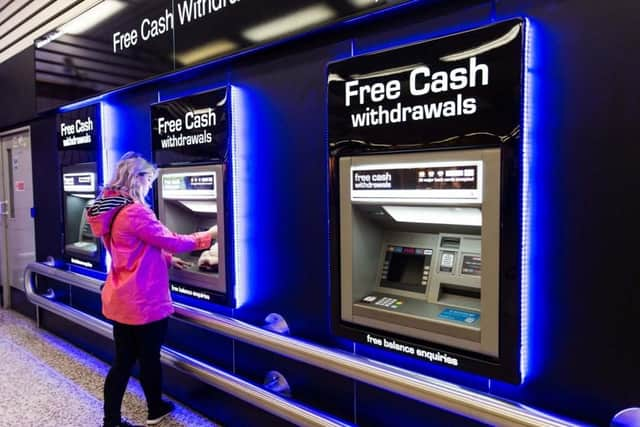Firms operating ATMs in Scotland face challenges of note - Philip Bowcock comment
ATMs are being forced to close or convert to a pay-to-use model on an ongoing basis as they struggle to remain commercially viable.
Scotland is more reliant on cash than any other part of the UK. However, while the UK as a whole is trying to find the right balance between financial digitalisation and protecting our cash infrastructure, Scotland is hurtling towards a cashless society faster than the other nations thanks to a perfect storm brewing behind the scenes.
Advertisement
Hide AdAdvertisement
Hide AdLast year, amidst the biggest programme of bank closures in a decade, the Supreme Court made a landmark ruling, determining that no additional business rates could be charged on "through the wall” ATMs throughout England and Wales.


This ruling doesn’t apply to Scottish ATMs, though, resulting in Scottish businesses being charged additional business rates by local authorities for operating such ATMs onsite.
This means cash machines in Scotland must be used 40 per cent more than in England and Wales just to break even. In practical terms, Scottish ATMs must achieve more than 3,500 withdrawals per month to be cost neutral, while in England and Wales this figure sits at around a much more achievable 2,400.
The devastating effect of this ATM double tax on Scotland’s access-to-cash picture cannot be understated. Of the 1,009 cashpoints currently operated by NoteMachine in Scotland, 432 are at risk of being removed and another 100 have been earmarked for closure in December.


Tragically, the ones ultimately suffering are small-business-owners who benefit from cash being withdrawn and spent, and the local communities whose vital access to cash continues to be reduced.
Of course, in addition to the risk posed by this double business rates issue, Scotland is far from immune from the broader decline in cash access. Changes to the historical way the ATM network was funded has left many providers with no choice but to close unviable sites or else start charging for use.
Between July 2018, when the funding changes were made, and February 2021, the number of ATMs in the UK fell by 12,124, or 18 per cent. While some of this change is attributable to temporary closures during the Covid-19 pandemic, this large reduction highlights the drastic impact ATM funding has had on provision.
Options
This has left ATM operators such as NoteMachine with two options – to stay operational and charge consumers to withdraw their own cash at some ATMs, or remove loss-making machines altogether.
Advertisement
Hide AdAdvertisement
Hide AdThis is not a choice that ATM operators relish – we recognise the vital importance of cash to local economies and wholeheartedly believe consumers need to have convenient and free access to their cash. While the long-term trend is away from cash, solutions need to be found that protect the right of people to access their cash for free and safeguard Scotland’s cash infrastructure for the future.
Cash is still the bedrock of local economies, particularly in rural areas where connectivity is far from guaranteed. Across the UK, 55 per cent of small and medium-sized businesses do not accept card payments and rely entirely on cash. As such, the impact on local businesses and communities of removing free-to-use ATMs is drastic.
As a result, businesses could have to change their entire payment models, which unnecessarily risks leaving a number of digitally excluded consumers out in the cold.
Those at risk from a cashless society are the most vulnerable members of our communities, including the elderly, those from lower-income backgrounds, and those with disabilities.
Struggle
It is a well-documented fact that there are 8 million adults across the UK who would struggle in a cashless society, while 1.3 million adults do not have a bank account. Often these individuals are not in this position by choice, and it seems unethical to assume they have the ability to easily make the change to digital payments.
Whilst the Covid pandemic affected the levels of cash being withdrawn UK-wide, the subsequent bounceback in withdrawals in line with increased footfall shows that cash is far from dead.
Indeed, cash has a leading role in economic recovery for some of the worst-hit industries, with much of it being spent in hospitality and leisure, sectors that are crucial to the wider UK economy, but also for Scotland. Here, the continued reliance on cash is evident – this post-pandemic recovery in cash usage has been clear with the value of cash withdrawn per ATM up 11 per cent since October 2020.
Free-to-use cash machines aren’t just a nice-to-have – they’re a crucial part of Scotland’s economic infrastructure, and solving the business rates issue is a simple way for the Scottish Government to protect access to cash.
Advertisement
Hide AdAdvertisement
Hide AdNoteMachine is therefore seeking to work cooperatively with the Scottish Government and local authorities to ensure business rates do not further undermine the Scottish ATM network. We need to see access to cash protected for Scottish businesses and communities alike.
Philip Bowcock, chief executive of NoteMachine
A message from the Editor:
Thank you for reading this article. We're more reliant on your support than ever as the shift in consumer habits brought about by coronavirus impacts our advertisers.
If you haven't already, please consider supporting our trusted, fact-checked journalism by taking out a digital subscription.
Comments
Want to join the conversation? Please or to comment on this article.
